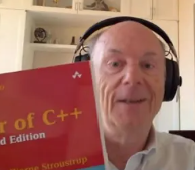Using modules in the big three compilers
With detailed step by step instructions on how to make it work...
Using modules in the big three compilers: a small experiment
From the article:
The goal of my experiment was to see how easy it is to write code that a) uses C++20 modules, b) can be compiled by GCC, Clang and MSVC without using conditional compilation, c) imports something from the standard library, d) exports at least one templated function, e) has a peculiarity that makes the module harder to find (in my case, the module is named b but the file that contains it is named a.cppm).
The experiment sort of succeeded...

 Hot off the video press:
Hot off the video press: ABSA == Ask Bjarne Stroustrup Anything:
ABSA == Ask Bjarne Stroustrup Anything: More safety please:
More safety please: Const... times four:
Const... times four: Boost verison 1.81.0 released
Boost verison 1.81.0 released